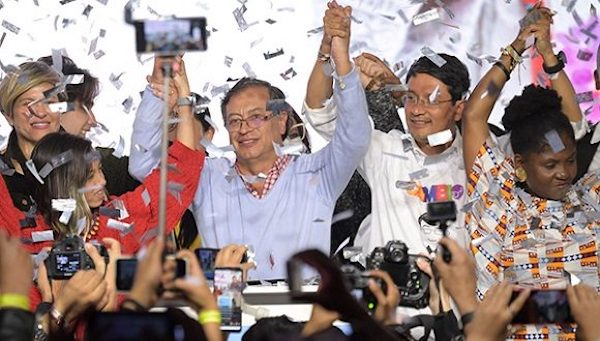With just over 98 percent of the precincts counted, the triumph of Gustavo Petro, candidate of the Historic Pact, in the second round of the Colombian presidential elections was confirmed. Petro had 50.51 percent of the votes against 47.22 percent for his rival. It is an extraordinary victory, with not only national but also continental projections. First, because it takes place in a country subjected for long decades to the arbitrary rule of one of the most brutal and bloodthirsty right-wingers in Latin America. The twilight of its predominance was glimpsed in the first electoral round when Uribismo, as the personification of those nefarious political forces, could not even guarantee that one of its several candidates could make it to the runoff. That is why they had to resort to an operetta character such as Rodolfo Hernández, on whom they poured all their support and tried to present him as if he were a statesman when in fact he was a buffoon, and they failed in their endeavor. The candidates of the Historical Pact had to fight against an establishment that controls all the levers of power in Colombia, and managed to defeat it. A merit that, undoubtedly, should be saluted by all democratic forces in Latin America and the Caribbean.
We also said that this is a victory with continental projections because it reaffirms the winds of change that regained briskness in the region, after a brief interregnum of the right, with the election of Andrés Manuel López Obrador in Mexico in July 2018, followed the following year by the victories of Alberto Fernández in Argentina and Evo Morales in Bolivia, the latter frustrated by the conspiracy engineered by the OAS, the White House and the Bolivian fascist right wing. However, with the victory of Luis Arce in 2020, the course provisionally abandoned due to the coup was resumed and, subsequently, the victories of Daniel Ortega in Nicaragua, Pedro Castillo in Peru, Xiomara Castro in Honduras and Gabriel Boric in Chile, in addition to that of the Historical Pact in Colombia, reaffirmed the will for change that is increasingly stronger in this, the most unequal continent on the planet. This is a promising backdrop against which the great battle of the presidential elections in Brazil will be fought next October, where everything seems to indicate that Luiz Inacio “Lula” de Silva should win. In that case, we would once again have a Latin America tinged mostly red-a pale red, no doubt-but red nonetheless, and which opens the doors for renewed waves of transformation.
Obviously, Colombia’s tragic history forces us to be cautious. Petro is supposed to assume the presidency on August 7, when a new anniversary of the battle of Boyacá is commemorated. Therefore, there is a hill to climb of almost two months before the candidate of the Historical Pact settles in the Palacio de Nariño. Latin American history is prodigal in examples of stolen elections, assassinations and all kinds of stratagems aimed at circumventing the will of the majority of the population. We cannot forget what happened in Chile, when after Salvador Allende’s triumph on September 4, 1970, the right wing launched with all its might-with the emphatic support of Nixon from the White House- to prevent the Plenary Congress from ratifying the victory of the Popular Unity candidate. And in that effort they did not hesitate to assassinate René Schneider Chereau, a constitutionalist military officer and commander in chief of the Army, who had expressed the legalist vocation of the weapon.
In a country like Colombia, burdened by a succession of “narco-governments” that forged a solid alliance between paramilitarism, drug trafficking and the State security apparatus, it would not be surprising the existence of ultra-right sectors willing to do anything to prevent Gustavo Petro and Francia Márquez from taking office and, if that is not possible, to tie him up once in office so that he cannot govern. Let us not forget that in socio-political terms, in recent years Colombia has become a U.S. protectorate, with at least seven U.S. military bases installed in its territory and it would be naive to think that tonight U.S. officials will be toasting Petro’s triumph. Therefore, the Historical Pact has to redouble its attitude of permanent vigilance to prevent his victory from being stolen by the powerful Colombian right wing-which controls the wealth, the Judiciary and the big media-and its sponsors based in Washington. And for this it will be essential to count on “the other power” alternative to that of the establishment: the conscious, organized and mobilized people. The worst thing that could happen to the good and noble people nucleated in the Pact would be to think that the task is over and that it is time to go home. That is why it is encouraging to know that a few hours ago Petro wrote in a tweet that “today is the day of the streets and the squares”. I would add, however, that from now on every day should be a day of streets and squares because it is the only, exclusive, guarantee that a popular government has to. This is not advice of this modest analyst but the central thesis of Niccolo Machiavelli when inquiring about the foundations of the political stability of popular governments. Let us hope that Petro, Francia Márquez and all their supporters take into account what the father of modern political science wrote.
Source: Pagina 12, translation Resumen Latinoamericano–English

